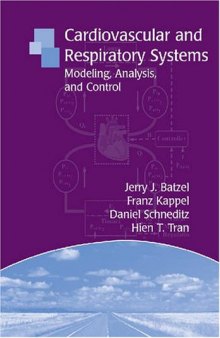 جزییات کتاب
جزییات کتاب
The human cardiovascular and respiratory control systems represent an important focal point for developing physiological control theory because of the complexity of the control mechanisms involved, the interaction between cardiovascular and respiratory funcÂtion, and the importance of this interaction in many clinical situations. This volume brings together the range of control processes involved in the effective regulation of these systems and develops modeling themes, strategies, and key clinical applications using contemporary mathematical and control methodologies. The reader will gain an appreciation of how analytical techniques and ideas from optimal control theory, systems theory, and numerical analysis can be utilized to better understand the regulation processes in human cardiovascular and respiratory systems. Cardiovascular and Respiratory Systems: Modeling, Analysis, and Control uses a principle-based modeling approach and analysis of feedback control regulation to elucidate the physiological relationships. Models are arranged around specific questions or conditions, such as exercise or sleep transition, and are generally based on physiological mechanisms rather than on formal descriptions of input-output behavior. The authors ask open questions relevant to medical and clinical applications and clarify underlying themes of physiological control organization. Current problems, key issues, developing trends, and unresolved questions are highlighted. Researchers and graduate students in mathematical biology and biomedical engineering will find this book useful. It will also appeal to researchers in the physiological and life sciences who are interested in mathematical modeling. List of Symbols and Abbreviations; Preface; Chapter 1: The Cardiovascular System under an Ergometric Workload; Chapter 2: Respiratory Modeling; Chapter 3: Cardiorespiratory Modeling; Chapter 4: Blood Volume and the Venous System; Chapter 5: Future Directions; Appendix A:



 دانلود کتاب
دانلود کتاب

 جزییات کتاب
جزییات کتاب





 این کتاب رو مطالعه کردید؟ نظر شما چیست؟
این کتاب رو مطالعه کردید؟ نظر شما چیست؟
